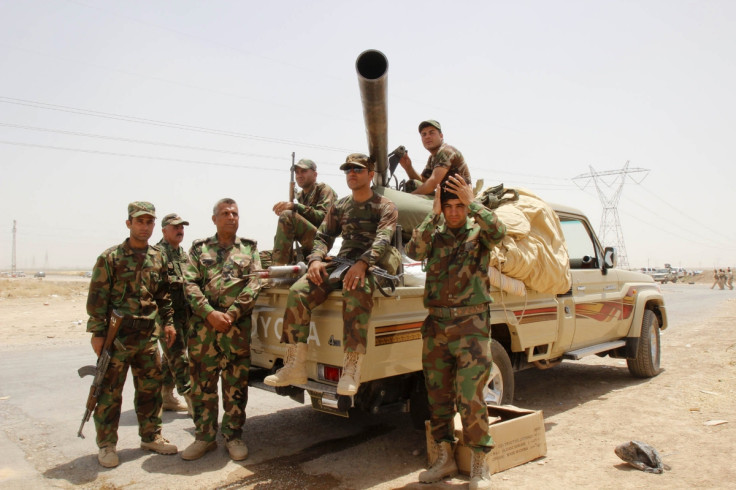Isis Iraq Insurgency Leaves Kurds With Leverage

The Sunni militant group Isis (Islamic State of Iraq and the Levant) has dominated the world's media since it took control of Iraq's second city Mosul this week. A fearsome reputation for brutality (the group was disowned by al Qaeda for excessive violence) has spooked Western leaders.
The brazen seizure of Iraq's northern capital caught Baghdad and Washington off guard. The towns of Baiji and Tikrit fell to militant groups in quick succession, while the Isis juggernaut swept south and east towards the capital Baghdad, exploiting the vacuum left by the fleeing security forces.
The dramatic collapse of the central government's military power in the north has handed Isis control of more territory in Iraq than at any point in its short history. International leaders are jittery at the advance of such extreme ideologues. So gravely do regional players view the Isis threat, that long-term adversaries Iran and the United States find themselves lining up as allies.
The speed of Isis' improbable advance has been crucial to their recent successes but it has also masked the group's limitations. Expert analysts find it improbable that the scenes of desertion witnessed in Mosul, where Iraqi forces dropped their weapons and fled, would repeat themselves in the country's south.
"The army and security forces around Baghdad are much more competent and organised than the guys that were up in Nineveh province, Tikrit and Salehuddin," says Jamie Ingram, an Iraq specialist at IHS. "There's also the presence of the Shia militias that are going to form the core components of this volunteer army that Maliki's been calling for now."
The country's well-documented sectarian schism, brutally exposed widened through years of war, terrorism and mistrust, meant that the predominately Shia national army were viewed in the Sunni-majority Nineveh province as an arm of the country's divisive Shia Prime Minister, Nouri al Maliki.
"In terms of the army guys fleeing, part of that is down to the fact that they don't have any particular loyalty to that area. They were viewed, and they felt that they were viewed, as an occupying force. The tribes and the local residents certainly don't agree with ISIS themselves and have no allegiance to them but also they oppose the government," Ingram told IBTimes UK.
Meanwhile the security vacuum created over the past week present an opportunity for the Kurdistan Regional Government (KRG.)
Following the national army's retreat, the KRG's military, known as the Peshmerga, is now effectively the only organised fighting force in the north of the country. Heavily armed, well trained and extremely disciplined, the Peshmerga acted swiftly to secure of the oil-production hub of Kirkuk against possible Isis incursions.
The city lies outside of the KRG's recognised borders but it is viewed by the Kurds as a spiritual home. With the central government busy reorganising in preparation for clashes with Isis further south, the Kurds have established a large presence in Kirkuk. Peshmerga seized a recently abandoned military base in the heart of the city and are patrolling the streets.
"The central government, as it stands is in no position to successfully counter the Isis offensive, let alone then move in and try and convince the Kurds to withdraw their forces from there. The fact on the ground is that the Kurds currently are in control of Kirkuk," Jamie Ingram told IBTimes UK.
In their long-running dispute over territory and the right to sell oil independently of central government, the Kurds are in a stronger position than they were a week ago. The presence of Isis in the north is not ideal for the KRG but they will be confident that Peshmerga forces will be able to repel potential attacks from the Sunni militants. There have been reports of some minor clashes between the groups around Kirkuk but it appears Isis is steering clear of the Kurds for now.
With Iraq's Prime Minister still to form a government in Baghdad and lacking a security presence in the north of the country, the KRG is well positioned to squeeze extra concessions from the central government. In return, Maliki could seek to build a fighting coalition with the Peshmerga to drive Isis out of the north of the country.
"If the KRG do ally with the central government in an offensive then they would risk reciprocal attacks on Kurdish territory. They are going to be weighing up and seeing what the government has to offer, and what the risks are in them joining in any military confrontation with ISIL," says Ingram.
The KRG will leverage whatever gains they can from Baghdad, whether it is budget hand outs or explicit permission to sell and market oil independently. It is premature to say whether the dream of securing Kirkuk as the capital of the Kurdish territory could be realised, but the Kurds in de-facto control of the city, the possibility certainly seems more concrete.
© Copyright IBTimes 2024. All rights reserved.







